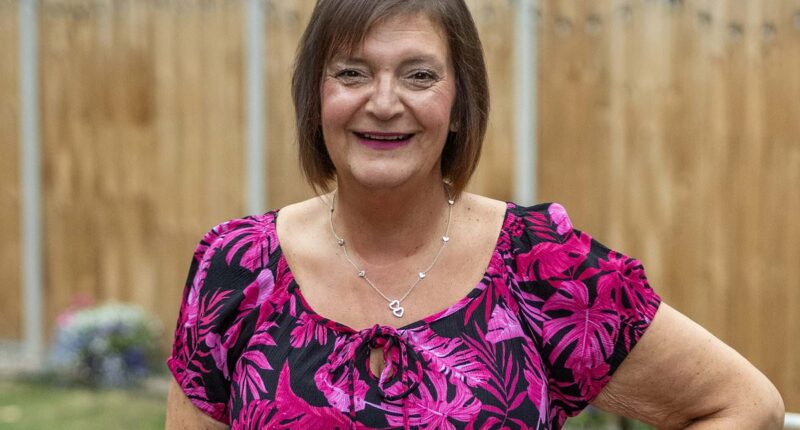Share this @internewscast.com
For Julia Dore, Mounjaro has improved her life in ways she could never have imagined – but she now faces an agonising dilemma.
In March, the 51-year-old, who weighed nearly 19 stone, joined a million others in Britain who are privately paying for weight-loss injections that have transformed obesity treatment. After a lifetime struggle with her weight, having tried various diets and fasting methods, the results have been remarkable.
In just six months she shed five-and-a-half stone – while her blood pressure, blood sugar and cholesterol levels fell steeply.
After experiencing a heart attack in her 40s, she can now – for the first time in years – climb stairs and walk her dog without being short of breath.
Not surprisingly, this has also improved her self-esteem. ‘I feel like a completely new person,’ she remarked. ‘Obesity affects everything—it completely dominates your mental state. It feels like you’re always being mocked because you’re the heaviest person in the room.’
‘Losing weight on Mounjaro has been absolutely life-changing. I feel alive again.’
But, there’s an unexpected drawback.
Just weeks after Ms. Dore began purchasing the injections, the Health Service announced they would be made available, for the most seriously ill patients, on the NHS.

After a lifetime struggle with her weight, which saw her try countless diets and fasting regimes, Julia Dore, 51, began paying privately for weight-loss jabs in March.
The drugs can now be prescribed to patients with a body mass index (BMI) higher than 40 and at least four other weight-related conditions.
Since Ms. Dore had a BMI of 43 when she began Mounjaro – along with heart issues, diabetes, high blood pressure, and high cholesterol – she naturally thought doctors would prescribe her the drug.
But although she absolutely would have been eligible back in March, by the time she saw her GP, she’d lost so much weight she no longer met the criteria. Shockingly, her doctor said her only way to qualify for an NHS prescription would be to regain weight – a prospect she described as ‘truly soul-destroying’.
Yet continuing to buy the jabs privately could soon prove unaffordable – with the cost of Mounjaro set to rocket.
Earlier this month, drug giant Eli Lilly announced that from Monday the price of Mounjaro will rise steeply.
The highest 15mg dose will jump from £122 to £247.50 a month – an increase of more than 100 per cent.
Meanwhile, the cost of the smaller 5mg dose will rise from £92 to £135.
The annual outlay for some patients is set to soar from about £1,500 to nearly £3,000.
Ms Dore said: ‘Privately funding this treatment has done amazing things for my weight and health, but put me at a great disadvantage.

The results have been astonishing – in just six months Julia shed five-and-a-half stone – while her blood pressure, blood sugar and cholesterol levels fell steeply
‘Now I’ve been told my only option for getting the injections on the NHS is to put the weight back on. That isn’t fair. I can’t go back to the way I was. But I’m also worried paying will be difficult if the cost goes up too much.’
Experts warn that Ms Dore, a training and development officer who lives with her partner David in a Suffolk village, is not alone.
Like her, many across the country have been horrified to learn that by opting to fund their own treatment, they have ruled themselves out of getting the jabs on the NHS – and may never qualify.
Professor Naveed Sattar of the University of Glasgow said: ‘The drugs were not offered on the NHS when many first began paying out of their pockets.
‘As far as they’re concerned, they’ve saved the Health Service money. But now that they are, people are asking: “Why shouldn’t we get the injections on the NHS?”’
With the price of private supplies soaring, many people, he said, were considering drastic – and potentially dangerous – measures.
He said: ‘To fulfil the NHS criteria, some people are thinking their best choice is to come off the drugs and go back up to their previous weight.
‘But that could be extremely distressing, especially if they’ve got used to be being lighter, to controlling their food noise, to enjoying improved mobility. It could also increase their risk of weight-related problems like high blood pressure and diabetes.’ So how has it come to this – a ludicrous situation where offering powerful obesity jabs on the NHS could actually encourage people to pile on the pounds? And for those caught in this bind, what choices do they really have?
In recent years, appetite-suppressing jabs – known as GLP-1s – have become medicine’s most powerful weapon against obesity, which raises the risk of cancer, heart disease, diabetes and dementia and causes 30,000 deaths a year in the UK.
The NHS counts it a success if an obese patient sheds five per cent of their body weight. By contrast, people on Mounjaro – the brand name for tirzepatide – can lose up to 22 per cent, while those on Wegovy, brand name for a similar drug called semaglutide, typically drop about 15 per cent.
The weekly injections start on a low dose, which is gradually increased. Until recently they were available only privately, but word of their dramatic results spread fast – and hundreds of thousands signed up through clinics and online pharmacies.
Fearing an explosion in demand, ministers earlier this year announced a phased roll-out, with the jabs offered on the NHS only to the sickest patients.

But from Monday the highest 15mg dose of Mounjaro will jump from £122 to £247.50 a month – an increase of more than 100 per cent

But the strict rules have proved highly contentious – especially for people like Ms Dore, who would have qualified had they not paid privately.
Prof Sattar, who has acted as a consultant for drug firms but is not a shareholder, argues the phased introduction was justified. He said: ‘The initial approach targets patients at highest risk, where there are clear, realisable, benefits for the NHS in terms of saving money, reducing disease, lowering hospitalisations, and reducing the use of other drugs.
‘Many others could potentially benefit, but there’s not a huge amount of money in the system.
‘The NHS never anticipated so many people buying the injections privately and finding themselves in this tricky position.’
With Ms Dore now appealing to her MP to change the rules, Professor David Strain, of the University of Exeter Medical School, said doctors should be allowed more flexibility. ‘Where people have self-funded because the drugs weren’t on the NHS, if they can show what their BMI was when they started and prove they would have been eligible then, it seems reasonable for the NHS to take over their prescriptions,’ he said. ‘These people have responded well to the drugs.
‘The ongoing benefits are tremendous – while stopping would see them regain weight and suffer serious problems.’
For many shut out of NHS prescriptions, the idea of stopping the jabs – and piling weight back on – is unthinkable. So they are determined to keep paying privately, whatever it takes.
Among them is Jenny Lloyd, 50, from Windsor, a full-time carer for her 12-year-old son George, who has complex learning difficulties. Weighing 17.5st, she also suffered diabetes, kidney disease and angina – a heart condition that causes chest pain when blood flow to the heart muscle is reduced.
Although doctors assured her she would qualify for Mounjaro on prescription, she waited months before deciding to buy it through an online pharmacy. ‘My doctors basically said it was a miracle drug. But I was waiting for ever. My weight was out of control. And after they’d told me it was so amazing, why wouldn’t I start it? I just assumed that once I was eventually seen, the Health Service would be OK to start prescribing it,’ she said. For her, too, the effects have been spectacular. She’s lost almost 5st, her diabetes is now in remission, and she hasn’t had an angina attack for months.
Best of all, she can play properly with her son.
She said: ‘After school, George likes to play football in the field beside the house. Beforehand I struggled to walk across the road to get there; I would just sit while he kicked the ball.
‘But now I can run around and chase him. He loves it. It’s the best feeling in the world.’
When she returned to her GP to ask for a Mounjaro prescription, she was told her BMI was now too low. She said: ‘They told me they’d reconsider if I put the weight back on. But that would mean my diabetes coming back, my cholesterol going back up. It’s a big risk.
‘At the same time the cost of injections is rising. I can’t afford them. I’ve been crying my eyes out, worrying about what to do.’
For some people struggling to afford the higher fees, switching drug might be suitable.
Prof Strain recommended discussing the issue with a healthcare provider – but explained the same weight loss may be maintained with a cheaper alternative.
He said: ‘Mounjaro at maximum dose is superior for weight loss compared to Wegovy at maximum dose. But the majority of people taking Mounjaro are not on the maximum dose, meaning they may still be able to get a similar weight loss benefit from Wegovy, which would be cheaper.’
The official guidance for switching between weight-loss drugs is to stop one completely, then have a ‘wash-out’ period of several weeks while it leaves the system.
The new drug must then be started at the lowest dose – in case the patient reacts badly.
A month’s supply of the largest Wegovy dose, 2.4mg, is available from online pharmacies for around £200.
Another option for people hoping to get the injections on the NHS is to wait for the prescribing rules to change.
From next year, the criteria will be relaxed so anyone with a BMI over 35, along with four comorbidities, will be able to request a prescription.
From September 2026 the rules will be eased further, to include those with a BMI over 40 and three obesity-related conditions. But the NHS has warned it could take up to 12 years before all four million people deemed eligible by NICE actually get the treatment.
Another hope is that new drugs and greater competition among companies will bring down prices.
A new GLP-1 undergoing clinical trials is retatrutide, which may deliver up to 30 per cent weight-loss – but is unlikely to be available for a couple of years.
Last week trials of a new GLP-1 called orforglipron – which is taken as a pill rather than as an injection – showed it could help patients lose an average of 10.5 per cent of their body weight.
Until new products and more competition make the drugs cheaper, people who can’t get an NHS prescription or afford to keep paying privately, can make lifestyle changes to maintain weight loss.
Prof Sattar said: ‘If people stop taking the injections, their weight is likely to go back up. But they can slow that down by learning to eat better – eating fibre rich foods, more salads and veg, less carbs and more protein.
‘And if you’ve already lost weight, physical activity like walking can help stop you regaining it.’
Ms Dore, however, suffers from hypothyroidism – a condition where an underactive thyroid slows the metabolism and causes weight gain – and is convinced nothing will prove as effective for her as GLP-1 injections.
She said: ‘I was the woman who went to Slimming World and put on 2lb every week.’
She plans to keep fighting for Mounjaro on the NHS and said: ‘I’m trying so hard to do the right thing for my health. But I feel the system has left me completely alone and unsupported.’













